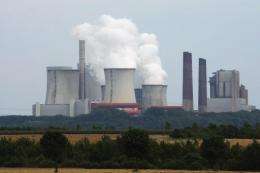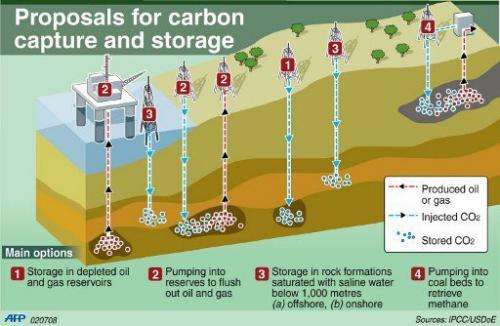'Carbon capture' too risky, earthquake prone: study

A proposed method of cutting harmful carbon emissions in the atmosphere by storing them underground risks causing earthquakes and is unlikely to succeed, a US study said Monday.
The warning came in a Perspective article in the Proceedings of the National Academy of Sciences, just days after another independent US study warned that carbon capture and storage (CCS) risked causing earthquakes.
CCS is currently considered a "viable strategy" by the UN Intergovernmental Panel on Climate Change for pollution control from coal-based electrical power generation and other industrial sources of carbon dioxide, said the PNAS study.
But while no large-scale projects are yet under way, the huge volume of fluid that would need to be stored below ground for long periods of time make the notion unrealistic, argued the study by experts at Stanford University in California.
"There is a high probability that earthquakes will be triggered by injection of large volumes of CO2 into the brittle rocks commonly found in continental interiors," said the article by Mark Zobacka and Steven Gorelick, professors in the departments of Geophysics and Environmental Earth System Science.
"Because even small- to moderate-sized earthquakes threaten the seal integrity of CO2 repositories, in this context, large-scale CCS is a risky, and likely unsuccessful, strategy for significantly reducing greenhouse gas emissions."

The technique aims to reduce carbon dioxide emissions to the atmosphere by capturing, liquefying and injecting them below ground at high volumes.
For CCS to work on a global scale, it would need to eliminate about 3.5 billion tons of C02 per year, or about the same volume as 28.6 billion barrels, said the study, noting that about 27 billion barrels of oil are produced yearly worldwide.
"Before embarking on projects to inject enormous volumes of CO2 at numerous sites around the world, it is important to note that over time periods of just a few decades, modern seismic networks have shown that earthquakes occur nearly everywhere in continental interiors," said the study.
CCS would also require an underground leak rate of less than one percent per thousand years "to achieve the same climate benefits as renewable energy sources," it said.
Underground injections of wastewater have already been linked to small to moderate earthquakes in the United States in recent years, it said, citing one apparent case as early as 1960 in Colorado and others last year in Arkansas and Ohio.
"The situation would be far more problematic if similar-sized earthquakes were triggered in formations intended to sequester CO2 for hundreds to thousands of years."
A separate study by the US National Research Council on Friday found that CCS "may have potential for inducing larger seismic events," while the earthquake potential from hydraulic fracturing was low.
CCS was singled out because proposed projects would involve injecting the largest volumes of fluids below the surface for long periods -- more than in fracking or traditional oil and gas operations -- and therefore may cause bigger earthquakes, it said.
However, there are no major CCS projects underway so the actual risk is difficult to assess and more research is needed, the NRC report said.
More information: “Earthquake triggering and large-scale geologic storage of carbon dioxide,” by Mark D. Zoback and Steven M. Gorelick, PNAS, 2012.
Journal information: Proceedings of the National Academy of Sciences
(c) 2012 AFP

















